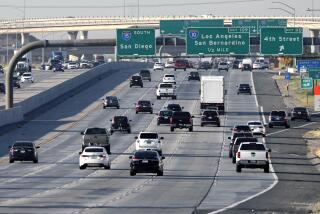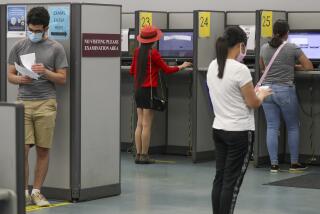Drinking, Driving and Death
- Share via
I take no position on the merit of Radley Balko’s Dec. 9 commentary, “Targeting the Social Drinker Is Just MADD,” but one assertion he makes is in error. He refers to “driving under the influence -- a less serious charge than driving while intoxicated.” A person who drives after drinking in California may be subject to prosecution under one of two provisions: driving with a blood alcohol level at .08% or more (or lower if the person is under 21) or driving under the influence, which means that the driver’s ability to control the vehicle is impaired by alcohol or a drug or a combination of the two (and “drug” means any drug, not just illegal drugs or those used with a prescription). Punishment for either is precisely the same and can be severe. Either will have the same effect on a driver’s license and upon the costs of insurance.
You don’t have to be “drunk” to be in violation of the law, and drivers in California should not be misled into thinking that it is less serious to be under the influence than to be intoxicated. The best advice remains: If you drink, don’t drive.
John Hamilton Scott
Sherman Oaks
*
Methinks Balko doth protest too much. Pointing out that the number of people killed by drunk drivers has leveled off at 16,000 a year hardly is a comforting statistic. If we are expected to give up or compromise some civil liberties to fight terror, why not do the same for a “terror” that kills as many as Sept. 11 nearly every two months? Sobriety checks being too invasive? The folks in the Washington area didn’t complain when roadblocks were used to look for the sniper.
Barry Rathner
Acton
*
Balko’s column disparages the efforts of MADD. Balko states that the checkpoints “do little to get dangerous drunks off the road.” I serve as a MADD volunteer at sobriety traffic checkpoints in north Orange County that are conducted by local police. At every stop, drivers are apprehended who are at or above the legal alcohol limit. I have witnessed drivers who could barely stagger to the Breathalyzer test station. I invite Balko to join me at a checkpoint and see for himself that they are effective.
Balko claims that cell phones, fumbling with the stereo and disciplining children are more hazardous than drunk driving. These are obviously bad practices, but they occur for only a few minutes, whereas drunk driving persists for the entire trip.
Floyd Sabins
Fullerton


